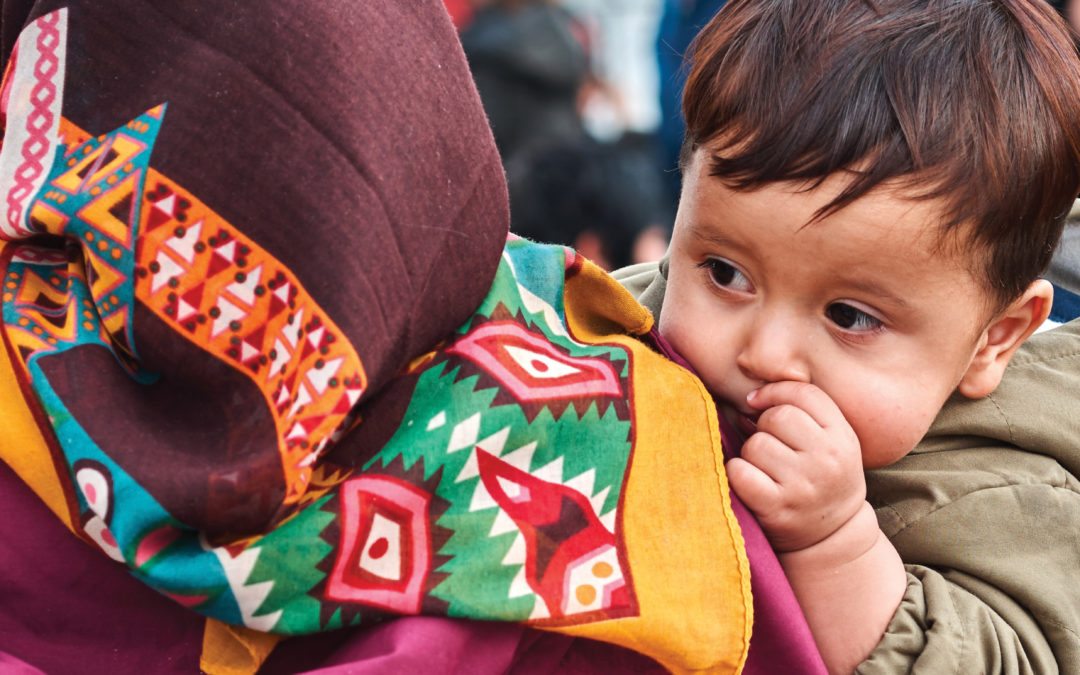By Anne Basye—
Make a list of twenty things that matter deeply to you: your children, your parents, your congregation…your great grandmother’s tea set… Are you up to 20 yet?
Now cross off five of them. Cross off five more. And then another five.
“When you’re a refugee, you can only take five things with you,” Nyamal Tutdeal tells people when she leads this exercise. “Some things you’ll lose for a while and get back, but some things you’ll lose forever.”
A sudden journey carrying hardly anything is a familiar theme this time of year. Joseph and Mary fled into Egypt with Jesus after learning their lives were in danger. Before that, they sought shelter in a town with no room for them.
“This is happening to people’s lives every day,” Nyamal says.
Refugees have been in the headlines in 2017 partly due to sheer numbers (22.5 million, all forced to flee their countries because of persecution, war or violence) and partly due to shifting political winds. Only one percent will be resettled in a new country—after spending about 17 years in a refugee camp waiting for their applications to be processed. Nyamal and her family are among the lucky few. (Read more of her story in the September 2016 issue of Gather.) Nyamal shares:
My father and mother left Sudan during the second civil war, and I was born in Ethiopia in 1985. When war broke out in Ethiopia, we walked back to Nasir, Sudan. It was a 110-mile walk. I was six years old. It took a month [to walk so far]. In 1996 we were resettled in Sioux Falls, South Dakota. Talk about a shock! Because my younger brother was born with a birth defect we qualified for a medical case and [because of] a family tie with our cousin in South Dakota, [we] were resettled in only three years from when we began the process.
Today I am studying for a master’s in international peace and conflict resolution and am a facilitator for a peace center. I want to change the narrative around refugees. They aren’t coming here to take our jobs. We can’t harden our hearts anymore because if you do, at the end of the day you will be the one missing out and hurting even more. As we all know, if you keep toxic things in your body, you will be the one dying!
THE DNA OF HOSPITALITY
Ask any refugee about his or her early years in the U.S., and you’ll probably hear a story about a church. Many congregations stepped up to resettle Cambodians, Vietnamese, Sudanese and Bosnians during the 1970s, 1980s and 1990s.
“Resettling refugees is in our DNA,” says the Rev. Chad Brekke, lead pastor at Prince of Peace Lutheran Church in Brooklyn Park, Minnesota. “Many congregations are looking to answer this call, but because of all kinds of political fears and suspicions, there isn’t the population to welcome.”
Still, 50,000 refugees have been resettled in 2017. In the emerging model of resettlement, a team of congregations may collaborate with a resettlement agency—often an affiliate of Lutheran Immigration and Refugee Service—on the tasks that help a newly arrived family feel at home.
First United Lutheran Church in Kennesaw, Georgia, recently walked alongside a Syrian family with two other ELCA congregations, the Lutheran Church of the Resurrection and Holy Trinity in nearby Marietta.
Working with Lutheran Services of Georgia, the coalition provided intense support during the first months, helping set up a home, assess health needs, find doctors and arrange visits, and accompany family members to medical appointments. Later they supported English language learning, tutored the children and brokered a new apartment lease.
“We were like their new neighbors, helping them negotiate the many tasks and challenges of resettling into this new country and culture,” says Susan Lyke, a member of First United. “Our message was, just call us if you need us. We used the phone app, Google Translate, constantly to communicate. As we got to know one another, we went to school functions and became their extended family.”
The family taught the coalition a thing or two about hospitality. “They invite us in; they share their food; if they hear someone is sick, they will rush right over. They never say ‘I’m busy’ the way we do,” Susan says.
During Advent, coalition members hosted the family for meals and shared Christmas cookies, a tree and lights, and other traditions. They helped Lutheran Services of Georgia pack warm clothes and blankets for other local refugees. This year, Susan plans to invite the family to church for Christmas Eve service.
“We’ve worked really hard to have trust so that the family knows we are acting out of our faith, not trying to convert them,” Susan says. A relationship has grown between the congregations and the family’s mosque, which invited all three congregations to a picnic last spring. “And now that we know them, none of us can say, ‘those Muslims, they…”
Following a nine-month relationship with the congregations, this resilient family is now self-sufficient. Everyone is still friends, and the two congregations are now preparing for a family coming soon from Myanmar.
Anne Basye is a freelance writer living in the Pacific Northwest She is the author of Sustaining Simplicity: A Journal (ELCA, 2007).
This article is excerpted from the December 2017 issue of Gather magazine. To read the full story or more like it, subscribe to Gather.


